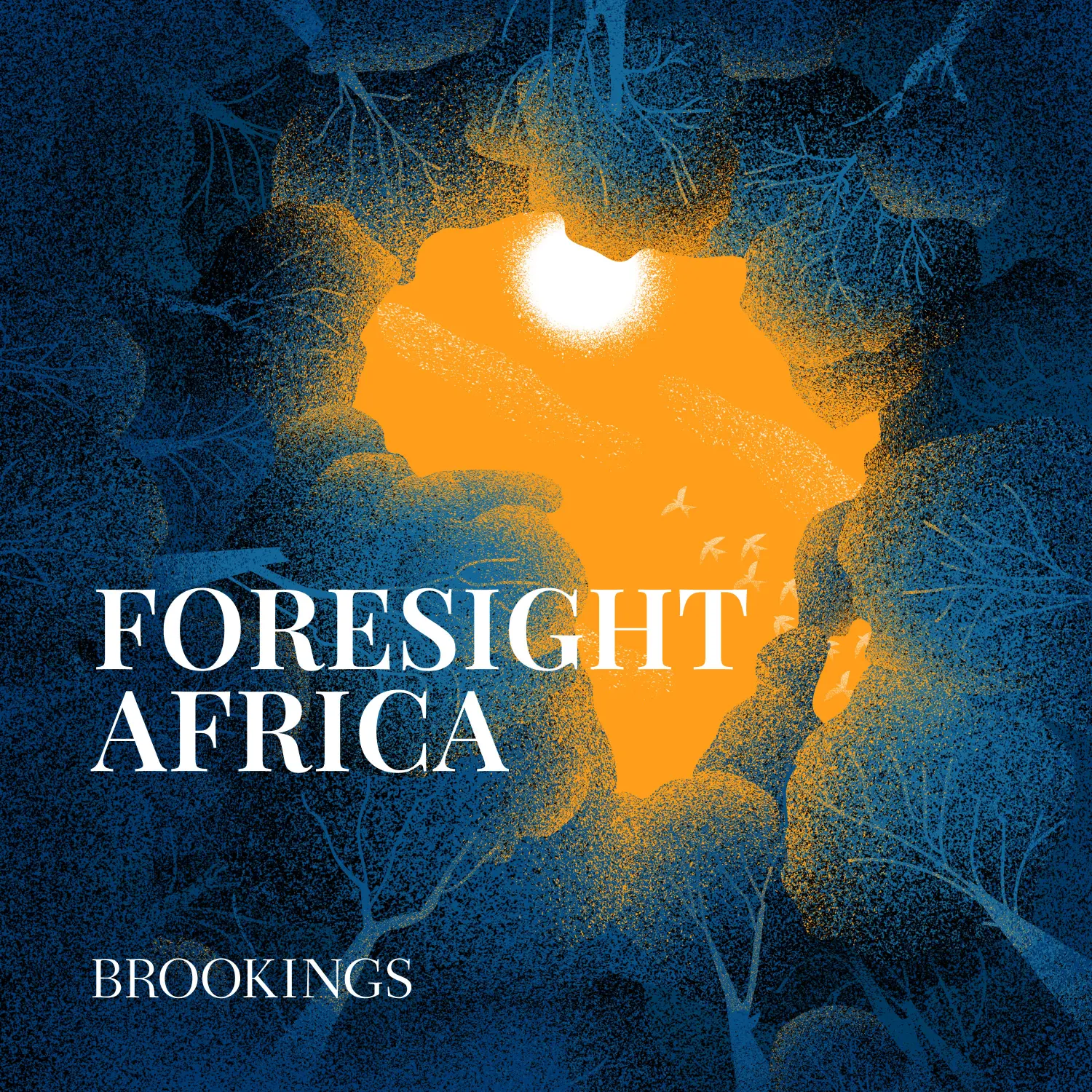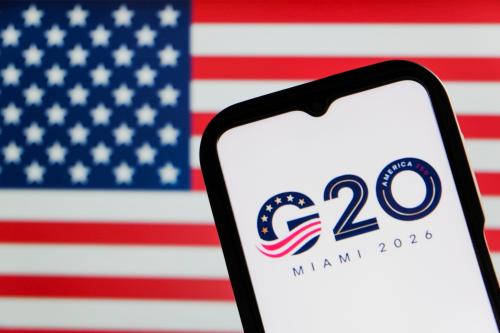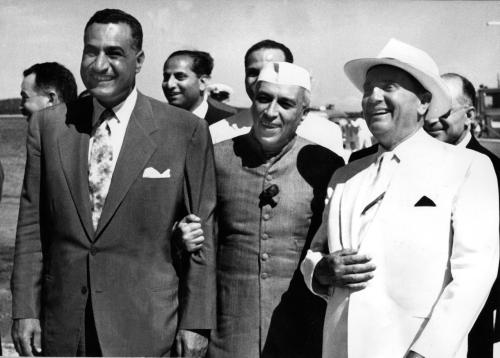This audio recording is part of the UNGA 2025 special episode of the Foresight Africa podcast. Listen to the first episode of the three-part series, which includes interviews with three other speakers on site at the event.
Landry Signé, senior fellow in the Global Economy and Development program and the Africa Growth Initiative at the Brookings Institution and host of the Foresight Africa Podcast, attended the U.N. General Assembly in September to speak with some of organization’s top leaders and international partners on the U.N.’s successes and future in a changing world.
In this interview, Landry speaks with Navid Hanif, Assistant Secretary General (ASG) for Economic Development at the U.N. Department of Economic and Social Affairs (DESA). Since joining DESA in 2001, ASG Hanif has served as the first head of the department’s Strategic Planning Unit, Director in the Office for Economic and Social Council Support, and Director of the Financing for Sustainable Development Office. He also co-coordinated a team that led to major reforms of the U.N. Development System in 2018.
Transcript
LANDRY SIGNÉ: Before we begin, could you please state your full name and title for the recording?
NAVID HANIF: Yeah, my name is Navid Hanif. I am the Assistant Secretary General for Economic Development at the UN Department of Economic and Social Affairs.
LANDRY SIGNÉ: I am delighted to have you join me during the 80th UNGA, and I truly appreciate you taking the time to share your insight with our audience. ASG, after 80 years of the United Nations, what do you see as the organization’s most enduring achievements, and how should these be built upon for the future?
NAVID HANIF: 80 years of the United Nations is a long span to cover for me but let me capture the key elements that I would like to highlight. First and foremost, the United Nations over the last 80 years has brought 193 countries together, built trust among them and brought them together to find solutions to common and shared challenges.
It’s not only climate change, loss of biodiversity, it is also about fighting poverty, giving life of dignity for all. Creating conditions where people can enjoy their human rights, and then a moral voice on this global stage to promote peace and security, to promote disarmament and un has given people hope, a shared vision for a future where no one will be left behind, and that is UN’s enduring contribution.
Absolutely for the goodness. For the good of humanity. Mm-hmm. And for the coming generation and for saving this planet.
LANDRY SIGNÉ: Amazing. Uh, ASG, how do you envision the UN as a whole, or your department in particular adapting to a rapidly changing global landscape marked by new technologies, shifting power dynamics and global crisis.
NAVID HANIF: The global landscape is changing very rapidly at some level. I am also witnessing tectonic shifts when it comes to geopolitical realignments. So these are not ordinary times. And you also mentioned technology. The technological disruptions that we are witnessing may be happening after half a century.
But at the same time, we also see crises in shocks which countries need to manage. You can call them poly crises or shocks, which are really packing up their cascading effects. But we also see opportunities and hope there. Let me share with you what, how is our department positioning itself and what we are advocating for?
The sustainable development goals, which are meant to end poverty. Mm-hmm. End hunger. Provide everyone access to health, water, and sanitation. Empower women, girls, education, also save the planet. Okay. Promote behavior of responsible consumption and production.
LANDRY SIGNÉ: Absolutely.
NAVID HANIF: And save biodiversity. So this is the, well what we call the 2030 agenda, but I call it, it’s our promise to people that they will have life of honor and dignity with opportunity for transformation.
So our department, despite these challenges is forging ahead. That the progress is lagging. In implementing this agenda, we have only 35% of the indicators of Sustainable Development Goals, either on track or moderately on track. Mm-hmm. So we have this unfinished business, unfinished agenda that we need to adopt.
The motto of the agenda is leave no one behind. So that means we have to fight two biggest challenges.
Mm-hmm.
Climate change. Inequality and both are critical. One for the future of this planet. Yes, and our economic prosperity because the floods, droughts, and hot weather are posing serious threats everywhere.
Los Angeles, in Pakistan, in Nigeria. So we are facing droughts and floods and fires everywhere. We need to fight back. We need to have both mitigation, which is reduce emissions, but adapt, get ready to live with these changes as we manage to prevent inequality within societies and among countries, is becoming intolerable for many people.
The concentration of wealth maybe we have never seen before. And the data abounds. So my department, we are advancing solutions for countries to accelerate the implementation of sustainable development goals, digitalization, energy, access to energy technology, which is affordable, accessible, and gives the ability capacity for people to use technology financing.
Biggest challenge. What are we doing? We recently, and there’s a success of multilateral agreement, adopted the severe commitment in Spain financing for development. Three key thingsbecause we have $4 trillion gap in investments in the SDGs and trillions of dollars are needed for fighting climate change.
First, massive push for investment, public and private. For countries to invest nationally and globally. Absolutely. Second, Africa is suffering from debt burden. Mm-hmm. Last year, the actual debt servicing burden was around $1.4 trillion. How do you expect countries to invest in sustainable development when their resources are being spent to service debt?
Second, debt crisis should be addressed with very concrete measures, debt swaps. We are creating a debt swap hub. Create conditions for countries to borrow local currencies, lessen their debt burden, and have architectural changes to make sure future crises do not happen. Lastly, you just mentioned geopolitical shifts.
Absolutely. Geo-economic realities. Mm-hmm. The system, the international financial system. It reflects realities of the past. Architecture should change to give voices to developing countries in decision making, emerging economies. We have now new economic weight. It should be reflected in decision making, so we need to change the governance of these institutions and make sure the architecture is designed for leaving no one behind responding to the needs of emerging economies.
And fighting climate change, loss of biodiversity and pollution.
LANDRY SIGNÉ: Powerful. ASG Hanif. What unique advantages and opportunities does the multilateral system offer countries today as they seek to advance their national priorities while contributing to global public goods?
NAVID HANIF: Thank you for such a pointed question I have just mentioned.
Tell me, is there any powerful country in the world that can fight climate change on its own? No. Not a single country. Any country that can stop the loss of biodiversity on its own, no. Any country that can fight pollution in the atmosphere, which affects every citizen, every country’s citizen, in terms of their lungs and their health. Can they fight it alone? No. So multilateral solutions for providing these global public goods are absolutely essential. There is no other choice than to come together, agree on solutions, then implement them together similarly, and it might appear, oh, I can solve it on my own job creation.
It’s a national policy design. But unless we give countries opportunities for trading very well managed opportunities for migration from learning from each other. I’m not talking about unchecked, but migration, where opportunities for education, learning on the job are created for youth to learn a multilateral system can help them.
Multilateral system is also critical when you’re hit by a crisis like the debt crisis we are faced. Be it G20, be it United Nations. We have always come together when we have a problem of heavy debt burden on countries. So multilateral solutions are the only way to address these. But I also want to identify Pact for the Future that the United Nations adopted last year. It is designed to also look at multilateral approaches. For handling the interests of future generations. We cannot leave to our future generations a planet, an economic framework. Yeah. Which does not give them any opportunity to prosperity to a future where they can also achieve their ambition, their aspirations.
So UN is not only focused on the present. But on the coming generation’s future and the future of this planet and all of this requires multilateral actions. I’m this coming from, for the first time we held, it’s called the Biennial Summit. Oh, on financing for development. What is unique about it?
Multilateral action at its best. Who did we get? Head of International Monetary Fund. the World Bank was also represented. World Trade Organization was there.
Head of G20, South Africa, head of G7, Mr. Mark Carney, Prime Minister of Canada, they all came together. The Secretary General of the UN convened the meeting to do what? To find collectively solutions that we are facing. And first we are facing prospects of. Very weak economic growth. Globally, we haven’t recovered, we haven’t come to the level before pandemic, and growth is critical for countries to earn and invest in development. So this summit, which has just concluded, is a reflection of how multilateral action can galvanize concrete steps that are needed to mobilize economic resources, actions. By policy makers designing policies which are meant to advance all sustainable development goals, please don’t pick and choose.
You cannot achieve health goals unless you improve your infrastructure for lifestyle changes. You cannot achieve health goals until you have transportation system, which is not polluting your air. You cannot achieve hot schools unless you have water and sanitation. So all of these sectors have to come together in policy design to achieve the 2030 agenda.
LANDRY SIGNÉ: Powerful ASG. And really, I really like how you connect the dots between the complex system and the specific action and multi stakeholder approach to solve those challenges. Looking ahead. What key priorities and recommendations will guide your department work during this 80th session of UNGA?
And how do you hope these will shape the next phase of the UN role in global governance?
NAVID HANIF: That is a question which actually requires foresight. Foresight we usually do by developing scenarios. Right. So look at what, what are the possibilities? And we are an organization which is in the business of hope. We want to give people hope that tomorrow is better than today, despite the challenges. And it’s not naive optimism, optimism, based on what we have delivered so far and what we are capable of delivering, when we work together. Okay, so what do we foresee? And if I give you a scenario, business as usual may not take us very far. If we continue, you just use the word systems change. So what we are advocating for, and we have done extensive work on how international financial architecture needs to be redesigned.
So when you talk of global governance, international financial architecture needs to change. Voice and participation. Policy design. Mm-hmm. Implementation. All of these, especially in the area of sovereign debt, it’s outdated. We need to revisit the whole structure. Global governance also needs to improve and varies impactfully, the way we measure success, the way we measure impact at the country level.
As of now too many frameworks driven by donors or entities who are giving resources to developing countries, what we foresee a new development cooperation architecture. Let me immediately unpack it for you. What is development cooperation, official development assistance the North provides? Then you have new providers.
China, India, Brazil, South-South cooperation, piece of development, cooperation, growing very fast. And then you have philanthropy. These three actors are, and we did not see these even 15 years ago, so this development cooperation landscape with these three kinds of providers and recipient countries who have now developed sustainable development strategies.
They want this cooperation to be aligned with their, there should be country ownership, that there should be policy coherence by the providers impact measurement, which is shared by the recipient country and the provider. And then, so what we are talking about alignment, impact policy, coherence in architecture, which is not governed by one committee of donors.
Governance, which happened at the United Nations. Yes. Where everyone has an equal voice providers and recipients so that we can see impact on the ground. So this is another area where we see architectural change in governance since United Nations is also about peace and security. Mm-hmm. Another governance change is the security Council where membership has to be revisited to reflect new realities that should capture the new power structure.
So, all of these changes we think in the global governance are required and our department will work on the financial side, on the development cooperation architecture. One more area where our department is leading international tax cooperation. Yes. Allocation of taxing rights. The model is used is almost a hundred years old.
We need to look at the digital economy and the profits that are generated in. Markets, which are mostly in developing countries. So there’s a UN framework convention on tax cooperation. Absolutely. Negotiations are going on. And then there’s change in global governance. So there are many things that my department is supporting and we remain confident that with multilateral mindset, countries will converge and find solutions.
Despite the tremors we are feeling from some quarters. The severe commitment adopted in July gives me hope and reassurance. The pandemic treaty, adopted in Geneva, and recently we rectified the biodiversity beyond national jurisdictions. These are multilateral agreements happening now, so I remain confident that multilateralism will continue to be impactful, result oriented, and make a difference in the lives of people all over the world, be it peace and security, development, or human rights, multilateralism is the only way to move forward.
LANDRY SIGNÉ: What a beautiful way to conclude. ASG Hanif, thank you so much for joining me today.
NAVID HANIF: Thank you for the opportunity. It was a conversation I think that you made very meaningful today.
LANDRY SIGNÉ: Very much appreciated. Thank you.
-
Acknowledgements and disclosures
The Foresight Africa podcast is brought to you by the Brookings Podcast Network. Send your feedback and questions to [email protected]. Special thanks to the production team including Fred Dews, producer; Dafe Oputu, and Nicole Ntungire, associate producers; Gastón Reboredo, audio engineer; and Izzy Taylor, communications manager in Brookings Global. The show’s art was designed by Shavanthi Mendis. Additional promotional support for this podcast comes from my colleagues in Brookings Global and the Office of Communications at Brookings.
The Brookings Institution is committed to quality, independence, and impact.
We are supported by a diverse array of funders. In line with our values and policies, each Brookings publication represents the sole views of its author(s).





Commentary
The United Nations at 80: The power of collective action
Foresight Africa podcast at UNGA 2025
October 8, 2025